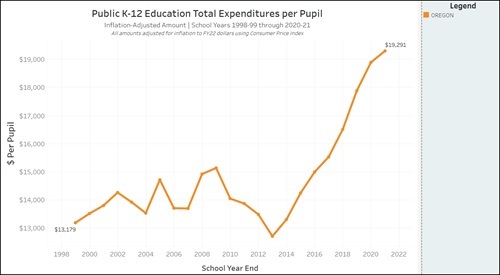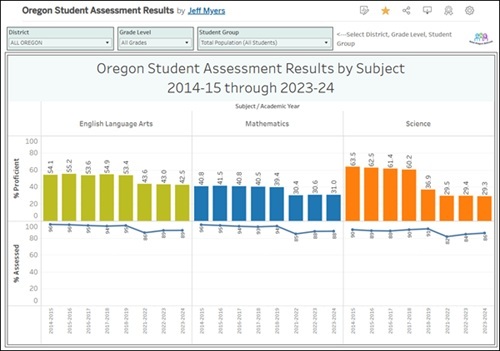How to move Oregon Public Education from “Debased-Research” to “Research-Based”
In 2023, Jeff Myers, Save Oregon Schools, teamed up with Dr. Bruce Gilley, Professor of Political Science at Portland State University, to do a comprehensive review and fact-checking of the Oregon Department of Education’s (ODE) research report on high-school graduation requirements, publishing two articles covering fraudulent research in ODE’s
2016 Chronic Absenteeism Statewide Plan and the
2021 Ethnic Studies Advisory Group Report.
They found a surprising disinterest among elected officials in harm to students. Meeting with Representative Courtney Neron, Chair of the House Education Committee, resulted in no action, which troubled Myers considering her background as an Oregon teacher for many years.
Myers said, “It shouldn’t take new legislation to ensure our state agencies produce and share factual research, but this glaring 'loophole' demands a solution. We also need to establish clear jurisdiction and a reliable process for reporting cases of fraud. Over the past 12 to 15 months, I’ve been repeatedly redirected, with every agency and office claiming it’s someone else’s responsibility to address these issues. This broken system needs repair, and it’s become evident that new legislation is the way forward.”
This week legislators held Legislative Days in preparation for the 2025 session. Meyers was focused on one critical issue: tackling the root cause of our struggling public education system—research fraud. What we’re being told the problems are is a conflict between the narrative versus reality.
The current narrative from school district leaders, teachers’ unions, and our elected officials is that we’re dealing with a funding problem. They regularly use phrases like “fully funding education”, yet we’ve been steadily and significantly throwing more money into our school system for years.
Adjusted for inflation, Oregon has increased the spending per student by over 46% from 1999 to 2021.
Education-funding
 Source: U.S. Public Education Dashboard, by Save Oregon Schools
Source: U.S. Public Education Dashboard, by Save Oregon Schools
After fluctuating in the first 14 years, you see a sharp, steady rise since 2013. Given the influx of money from the pandemic and Oregon’s Corporate Activity Tax, we likely will see the trend continue when the figures for 2022 and beyond are released. If you’re wondering how Oregon funding compares to other states, you can see for yourself in my U.S. Public Education Dashboard. For reference, Oregon per student spending is above California and the U.S. Average, but is below Washington.
So what are the results of this rising funding? Declining achievement for our students. Below is a snapshot from my Oregon Student Assessment Results dashboard, which uses data from the Oregon Department of Education on annual assessments.
 Source: Oregon Student Assessment Results dashboard, by Save Oregon Schools
Source: Oregon Student Assessment Results dashboard, by Save Oregon Schools
As you can plainly see in the dashboard, student achievement was on a slight downward trend until the COVID-19 pandemic hit, which resulted in a significant drop across the board. As the
Oregonian reported earlier this year, Oregon was the only state that hadn’t shown any improvement in reading or math skills since the pandemic.
A D V E R T I S E M E N T

A D V E R T I S E M E N T
Ensuring our public agencies produce factual research is not a partisan issue—it’s something everyone should agree that integrity in public research is essential. This is about holding our institutions accountable and restoring trust.
Myers puts forth a legislative concept and draft of his proposed “Public Research Integrity Act.”
Problem Statement
This proposed legislation addresses the growing concern over fraudulent research produced or disseminated by public officials in Oregon. Such research, which includes falsified data, manipulated conclusions, and omitted facts, undermines public trust, misguides policymaking, and diverts resources from critical state priorities.
By creating strict penalties and incentives for whistleblowers to report fraudulent practices, the law seeks to uphold the integrity of research used to inform public policy and governance. The legislation ensures accountability, transparency, and adherence to evidence-based standards, safeguarding the public from the harmful consequences of deceptive practices in government research and communications.
Proposed Solution
The proposed legislation, the "Public Research Integrity Act," establishes a comprehensive framework to combat fraudulent research by public officials in Oregon.
- Criminalizes the creation, dissemination, and approval of deceptive research or documentation, imposing penalties for violations, including classification as a Class A felony and permanent disqualification from public office.
- Introduces mechanisms for whistleblower protections and incentives, offering compensation to eligible individuals or organizations who report fraudulent activities.
- Ensures robust investigation processes led by the Oregon Department of Justice, with transparency in findings.
- Mandates the use of standardized definitions for research-related terms across agencies to enhance consistency and accountability.
This multi-faceted approach promotes transparency, deters misconduct, and reinforces public trust in government practices and policies.
Cost / Benefits
The proposed "Public Research Integrity Act" is expected to have minimal implementation costs, primarily associated with establishing a mechanism within the Oregon Department of Justice to receive and investigate complaints. These costs can be offset by fines collected from individuals or agencies found guilty of violating the Act, with a portion allocated to compensating whistleblowers to offset their costs for identifying the fraud and to reward them for providing a valuable service to all Oregonians.
The benefits, while challenging to quantify in monetary terms, are significant. By deterring fraudulent research, this legislation aims to reduce wasteful spending, prevent misguided policies, and ensure public funds are allocated based on accurate and reliable information. This will lead to more effective governance and better outcomes for Oregon’s citizens, particularly in areas like education, where fraudulent research has resulted in many harms against students and staff alike. The Act ultimately fosters public trust in government processes and reinforces the accountability of public officials to the people they serve.
Meyers’ draft legislation for “Public Research Integrity Act” can be viewed
here. He says: “What is at the root of our unique struggles in Oregon? Research fraud of course!”
--Donna Bleiler| Post Date: 2024-12-14 14:01:30 | Last Update: 2024-12-14 23:42:35 |







 Source: U.S. Public Education Dashboard, by Save Oregon Schools
Source: U.S. Public Education Dashboard, by Save Oregon Schools
 Source: Oregon Student Assessment Results dashboard, by Save Oregon Schools
Source: Oregon Student Assessment Results dashboard, by Save Oregon Schools
